
aiosql
Simple SQL in Python
Stars: 1290
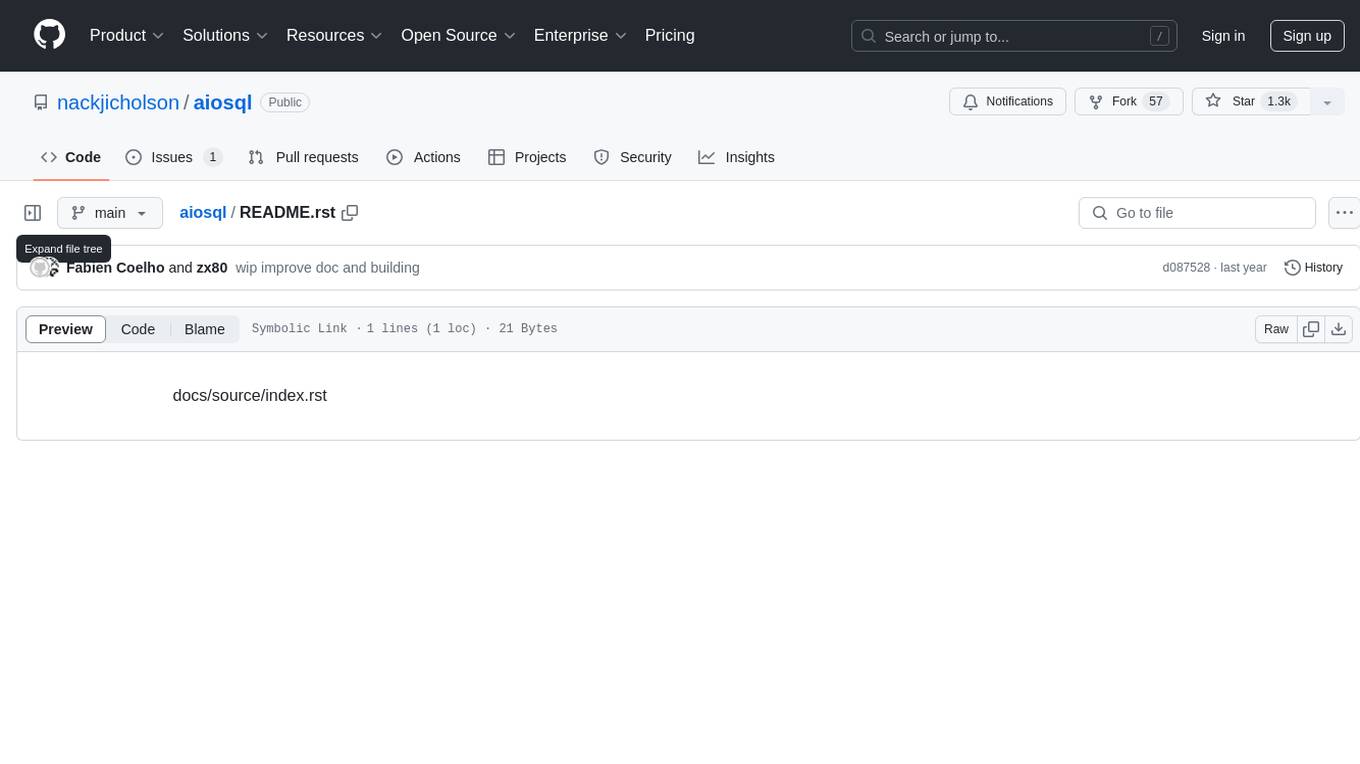
aiosql is a Python module that allows you to organize SQL statements in .sql files and load them into your Python application as methods to call. It supports various database drivers like SQLite, PostgreSQL, MySQL, MariaDB, and DuckDB. The project is an implementation of Kris Jenkins' yesql library to the Python ecosystem, allowing users to easily reuse SQL code in SQL GUIs or CLI tools. With aiosql, you can write, version control, comment, and run SQL code using files without losing the ability to use them as you would any other SQL file. It provides support for PEP 249 and asyncio based drivers, enabling users to execute parametric SQL queries from Python methods.
README:
SQL <https://en.wikipedia.org/wiki/SQL>__ is code.
Write it, version control it, comment it, and run it using files.
Writing your SQL code in Python programs as strings doesn't allow you to easily
reuse them in SQL GUIs or CLI tools like psql.
With aiosql you can organize your SQL statements in .sql files, load them
into your python application as methods to call without losing the ability to
use them as you would any other SQL file.
This project supports standard
PEP 249 <https://peps.python.org/pep-0249/>__
and
asyncio <https://docs.python.org/3/library/asyncio.html>__
based drivers for
SQLite <https://www.sqlite.org/>__
(sqlite3 <https://docs.python.org/3/library/sqlite3.html>,
aiosqlite <https://aiosqlite.omnilib.dev/en/latest/?badge=latest>,
apsw <https://pypi.org/project/apsw/>),
PostgreSQL <https://postgresql.org/>
(psycopg (3) <https://www.psycopg.org/psycopg3/>,
psycopg2 <https://www.psycopg.org/docs/>,
pg8000 <https://pypi.org/project/pg8000/>,
pygresql <http://www.pygresql.org/>,
asyncpg <https://magicstack.github.io/asyncpg/current/>),
MySQL <https://www.mysql.com/>
(PyMySQL <https://github.com/PyMySQL/PyMySQL/>,
mysqlclient <https://pypi.org/project/mysqlclient/>,
mysql-connector <https://dev.mysql.com/doc/connector-python/en/>,
asyncmy <https://github.com/long2ice/asyncmy> with
this adapter <https://github.com/GoogleCloudPlatform/database-assessment/blob/main/src/dma/lib/db/adapters/asyncmy.py>),
MariaDB <https://mariadb.org/>
(mariadb <https://pypi.org/project/mariadb/>),
DuckDB <https://www.duckdb.org/>
(duckdb <https://duckdb.org/docs/api/python/dbapi>) and
MS SQL Server <https//en.wikipedia.org/wiki/Microsoft_SQL_Server>
(pymssql <https://pypi.org/project/pymssql/>__),
However, some detailed feature support may vary depending on the underlying driver
and database engine actual capabilities.
Other SQL database drivers which support the pyformat or named
PEP 249 <https://peps.python.org/pep-0249/>__ paramstyles should work as well
by just passing the driver as a parameter when building queries. Thus
Oracle Database <https://en.wikipedia.org/wiki/Oracle_Database>__
(oracledb <https://oracle.github.io/python-oracledb/>) or
Snowflake <https://en.wikipedia.org/wiki/Snowflake_Inc.>
(snowflake.connector <https://docs.snowflake.com/en/developer-guide/python-connector/python-connector>__)
should work out of the box…
Please report with an issue if it actually works for you!
Otherwise, extensions to support other database drivers can be written by you!
See: Database Driver Adapters <./database-driver-adapters.html>__.
Feel free to pull request!
This module is an implementation of
Kris Jenkins' yesql <https://github.com/krisajenkins/yesql>__
Clojure <https://clojure.org/>__ library to the
Python <https://www.python.org/>__
ecosystem <https://pypi.org/>__.
.. NOTE :target: is needed so that github renders badges on a line. .. image:: https://github.com/nackjicholson/aiosql/actions/workflows/aiosql-package.yml/badge.svg?branch=main&style=flat :alt: Build status :target: https://github.com/nackjicholson/aiosql/actions/ .. NOTE hardcoded, this is maintained manually. .. image:: https://img.shields.io/badge/coverage-100%25-success :alt: Code Coverage :target: https://github.com/nackjicholson/aiosql/actions/ .. NOTE all tests
loading: 15 patterns: 5
sqlite3: 17 apsw: 16 duckdb: 14 mariadb: 17 pymysql: 16 mysqldb: 15 myco: 16 pymssql: 16 pg8000: 14 psycopg2: 18 psycopg3: 19 pygresql: 15
aiosqlite: 13 asyncpg: 18 .. image:: https://img.shields.io/badge/tests-244%20✓-success :alt: Tests :target: https://github.com/nackjicholson/aiosql/actions/ .. image:: https://img.shields.io/github/issues/nackjicholson/aiosql?style=flat :alt: Issues :target: https://github.com/nackjicholson/aiosql/issues/ .. image:: https://img.shields.io/github/contributors/nackjicholson/aiosql :alt: Contributors :target: https://github.com/nackjicholson/aiosql/graphs/contributors .. image:: https://img.shields.io/pypi/dm/aiosql?style=flat :alt: Pypi Downloads :target: https://pypistats.org/packages/aiosql .. image:: https://img.shields.io/github/stars/nackjicholson/aiosql?style=flat&label=Star :alt: Stars :target: https://github.com/nackjicholson/aiosql/stargazers .. image:: https://img.shields.io/pypi/v/aiosql :alt: Version :target: https://pypi.org/project/aiosql/ .. image:: https://img.shields.io/github/languages/code-size/nackjicholson/aiosql?style=flat :alt: Code Size :target: https://github.com/nackjicholson/aiosql/ .. image:: https://img.shields.io/badge/databases-6-informational :alt: Databases :target: https://github.com/nackjicholson/aiosql/ .. image:: https://img.shields.io/badge/drivers-15-informational :alt: Drivers :target: https://github.com/nackjicholson/aiosql/ .. image:: https://img.shields.io/github/languages/count/nackjicholson/aiosql?style=flat :alt: Language Count :target: https://en.wikipedia.org/wiki/Programming_language .. image:: https://img.shields.io/github/languages/top/nackjicholson/aiosql?style=flat :alt: Top Language :target: https://en.wikipedia.org/wiki/Python_(programming_language) .. image:: https://img.shields.io/pypi/pyversions/aiosql?style=flat :alt: Python Versions :target: https://www.python.org/ .. NOTE some non-sense badge about badges:-) .. image:: https://img.shields.io/badge/badges-16-informational :alt: Badges :target: https://shields.io/ .. image:: https://img.shields.io/pypi/l/aiosql?style=flat :alt: BSD 2-Clause License :target: https://opensource.org/licenses/BSD-2-Clause
Install from pypi <https://pypi.org/project/aiosql>__, for instance by running pip install aiosql.
Then write parametric SQL queries in a file and execute it from Python methods, eg this greetings.sql file:
.. code:: sql
-- name: get_all_greetings
-- Get all the greetings in the database
select greeting_id, greeting
from greetings
order by 1;
-- name: get_user_by_username^
-- Get a user from the database using a named parameter
select user_id, username, name
from users
where username = :username;
This example has an imaginary SQLite database with greetings and users. It prints greetings in various languages to the user and showcases the basic feature of being able to load queries from a SQL file and call them by name in python code.
You can use aiosql to load the queries in this file for use in your Python
application:
.. code:: python
import aiosql
import sqlite3
queries = aiosql.from_path("greetings.sql", "sqlite3")
with sqlite3.connect("greetings.db") as conn:
user = queries.get_user_by_username(conn, username="willvaughn")
# user: (1, "willvaughn", "William")
for _, greeting in queries.get_all_greetings(conn):
# scan: (1, "Hi"), (2, "Aloha"), (3, "Hola"), …
print(f"{greeting}, {user[2]}!")
# Hi, William!
# Aloha, William!
# …
Or even in an asynchroneous way, with two SQL queries running in parallel
using aiosqlite and asyncio:
.. code:: python
import asyncio
import aiosql
import aiosqlite
queries = aiosql.from_path("greetings.sql", "aiosqlite")
async def main():
# Parallel queries!!!
async with aiosqlite.connect("greetings.db") as conn:
greetings, user = await asyncio.gather(
queries.get_all_greetings(conn),
queries.get_user_by_username(conn, username="willvaughn")
)
for _, greeting in greetings:
print(f"{greeting}, {user[2]}!")
asyncio.run(main())
It may seem inconvenient to provide a connection on each call.
You may have a look at the AnoDB <https://github.com/zx80/anodb>__ DB
class which wraps both a database connection and queries in one
connection-like extended object, including managing a pool and performing
automatic reconnection if needed.
- You think SQL is pretty good, and writing SQL is an important part of your applications.
- You don't want to write your SQL in strings intermixed with your python code.
- You're not using an ORM like
SQLAlchemy <https://www.sqlalchemy.org/>__ orDjango <https://www.djangoproject.com/>__ , with large (100k lines) code imprints vs under 900 foraiosql, and you don't need to. - You want to be able to reuse your SQL in other contexts.
Loading it into
psqlor other database tools.
- You're looking for an
ORM <https://en.wikipedia.org/wiki/Object-relational_mapping>__. - You aren't comfortable writing SQL code.
- You don't have anything in your application that requires complicated SQL beyond basic CRUD operations.
- Dynamically loaded objects built at runtime really bother you.
For Tasks:
Click tags to check more tools for each tasksFor Jobs:
Alternative AI tools for aiosql
Similar Open Source Tools

aiosql
aiosql is a Python module that allows you to organize SQL statements in .sql files and load them into your Python application as methods to call. It supports various database drivers like SQLite, PostgreSQL, MySQL, MariaDB, and DuckDB. The project is an implementation of Kris Jenkins' yesql library to the Python ecosystem, allowing users to easily reuse SQL code in SQL GUIs or CLI tools. With aiosql, you can write, version control, comment, and run SQL code using files without losing the ability to use them as you would any other SQL file. It provides support for PEP 249 and asyncio based drivers, enabling users to execute parametric SQL queries from Python methods.
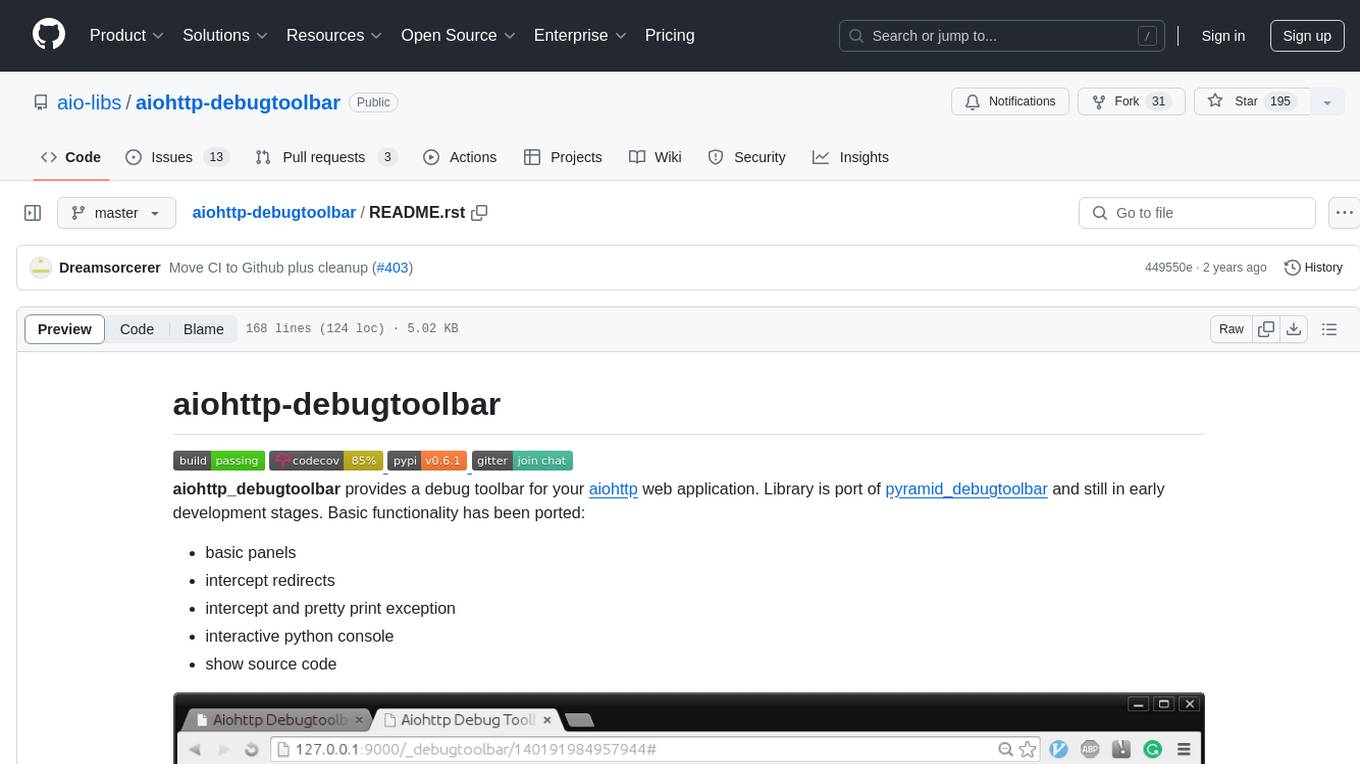
aiohttp-debugtoolbar
aiohttp_debugtoolbar provides a debug toolbar for aiohttp web applications. It is a port of pyramid_debugtoolbar and offers basic functionality such as basic panels, intercepting redirects, pretty printing exceptions, an interactive python console, and showing source code. The library is still in early development stages and offers various debug panels for monitoring different aspects of the web application. It is a useful tool for developers working with aiohttp to debug and optimize their applications.
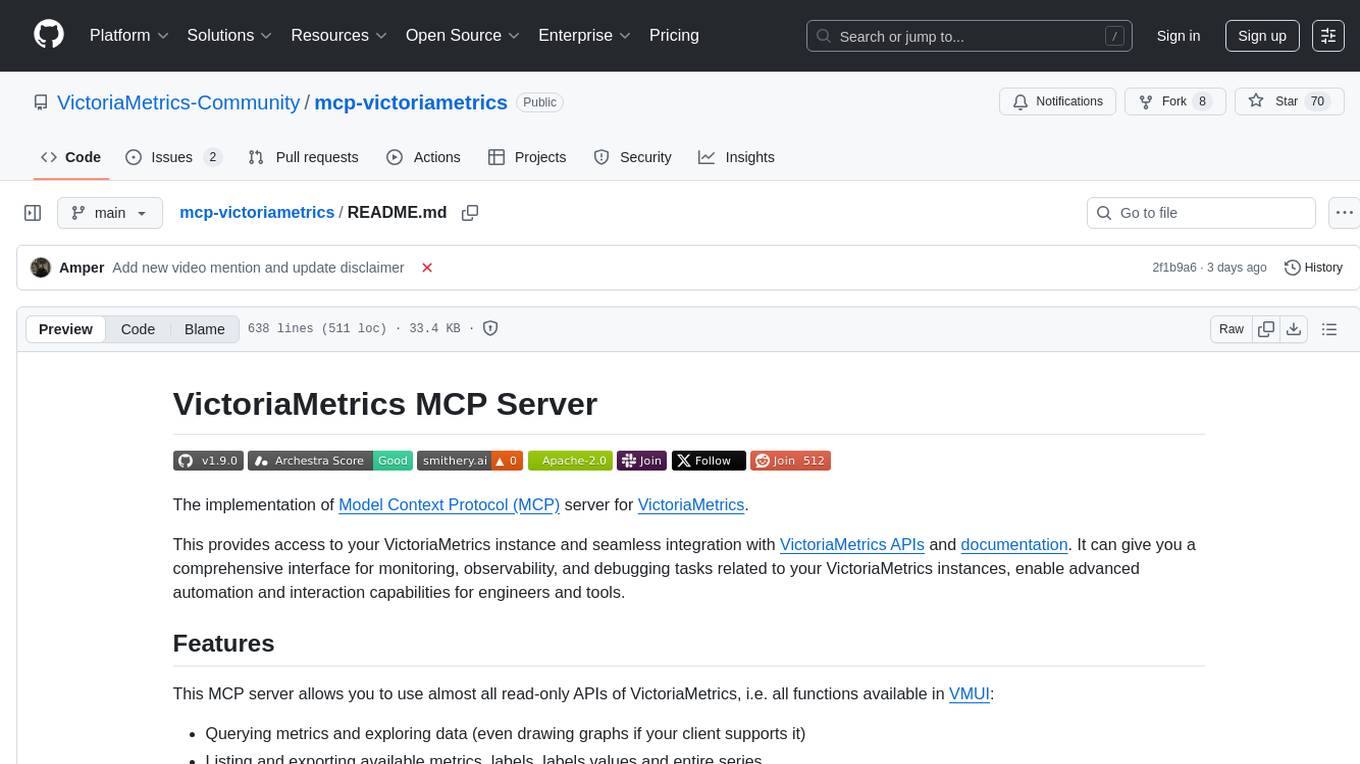
mcp-victoriametrics
The VictoriaMetrics MCP Server is an implementation of Model Context Protocol (MCP) server for VictoriaMetrics. It provides access to your VictoriaMetrics instance and seamless integration with VictoriaMetrics APIs and documentation. The server allows you to use almost all read-only APIs of VictoriaMetrics, enabling monitoring, observability, and debugging tasks related to your VictoriaMetrics instances. It also contains embedded up-to-date documentation and tools for exploring metrics, labels, alerts, and more. The server can be used for advanced automation and interaction capabilities for engineers and tools.
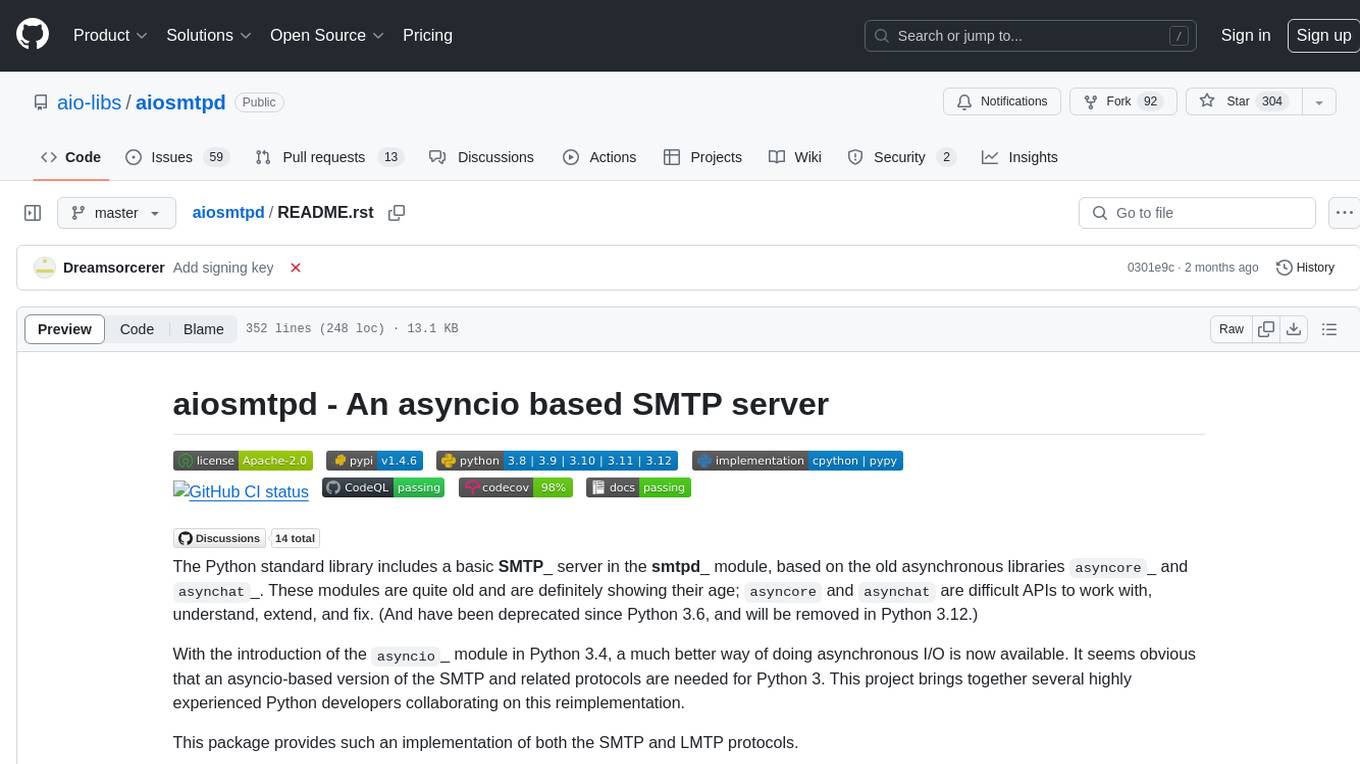
aiosmtpd
aiosmtpd is an asyncio-based SMTP server implementation that provides a modern and efficient way to handle SMTP and LMTP protocols in Python 3. It replaces the outdated asyncore and asynchat modules with asyncio for improved asynchronous I/O operations. The project aims to offer a more user-friendly, extendable, and maintainable solution for handling email protocols in Python applications. It is actively maintained by experienced Python developers and offers full documentation for easy integration and usage.
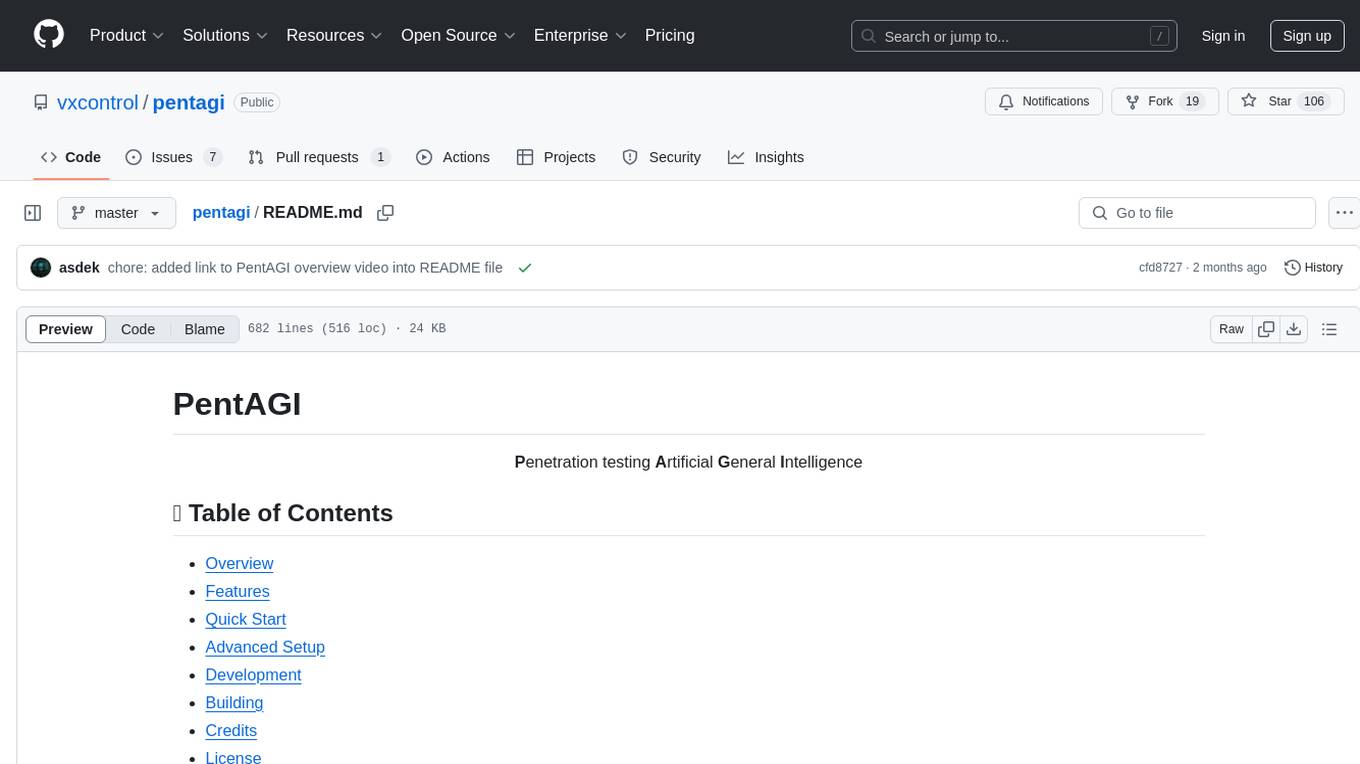
pentagi
PentAGI is an innovative tool for automated security testing that leverages cutting-edge artificial intelligence technologies. It is designed for information security professionals, researchers, and enthusiasts who need a powerful and flexible solution for conducting penetration tests. The tool provides secure and isolated operations in a sandboxed Docker environment, fully autonomous AI-powered agent for penetration testing steps, a suite of 20+ professional security tools, smart memory system for storing research results, web intelligence for gathering information, integration with external search systems, team delegation system, comprehensive monitoring and reporting, modern interface, API integration, persistent storage, scalable architecture, self-hosted solution, flexible authentication, and quick deployment through Docker Compose.
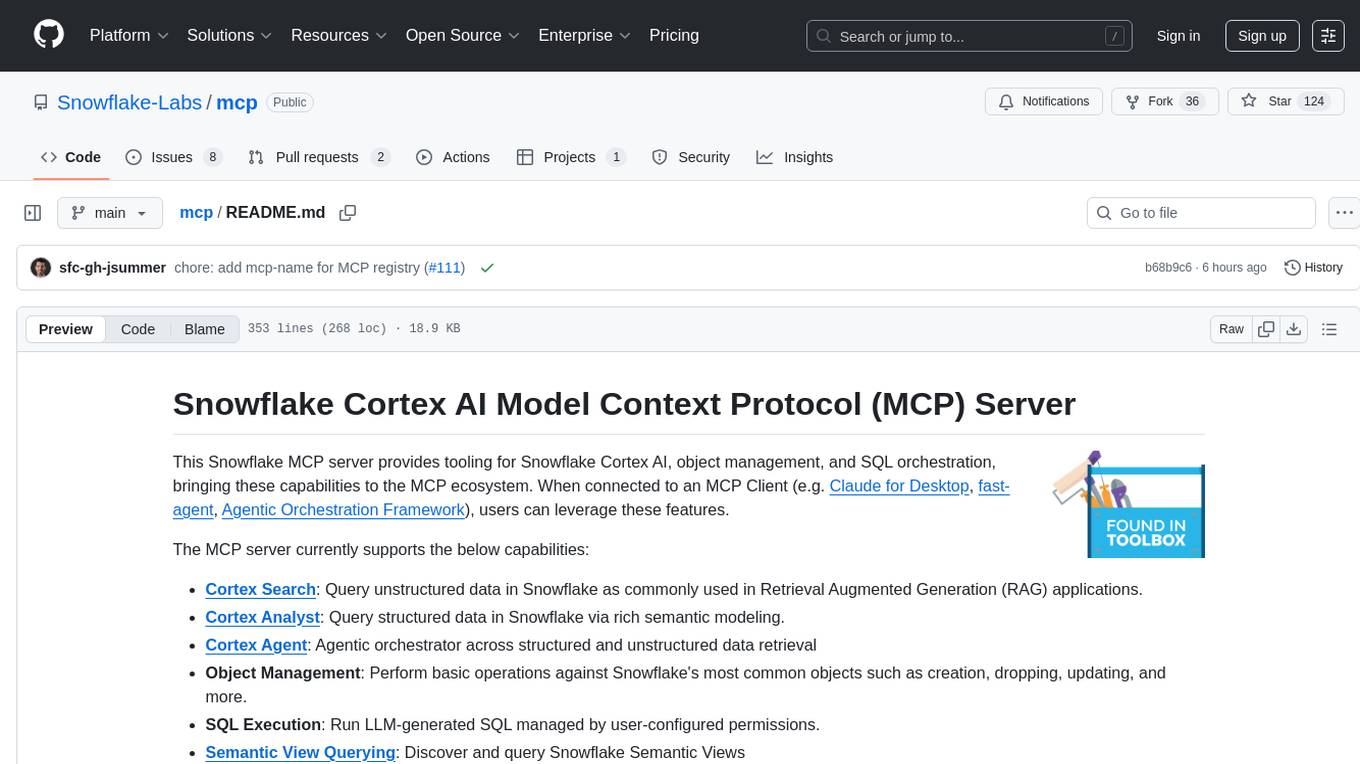
mcp
The Snowflake Cortex AI Model Context Protocol (MCP) Server provides tooling for Snowflake Cortex AI, object management, and SQL orchestration. It supports capabilities such as Cortex Search, Cortex Analyst, Cortex Agent, Object Management, SQL Execution, and Semantic View Querying. Users can connect to Snowflake using various authentication methods like username/password, key pair, OAuth, SSO, and MFA. The server is client-agnostic and works with MCP Clients like Claude Desktop, Cursor, fast-agent, Microsoft Visual Studio Code + GitHub Copilot, and Codex. It includes tools for Object Management (creating, dropping, describing, listing objects), SQL Execution (executing SQL statements), and Semantic View Querying (discovering, querying Semantic Views). Troubleshooting can be done using the MCP Inspector tool.
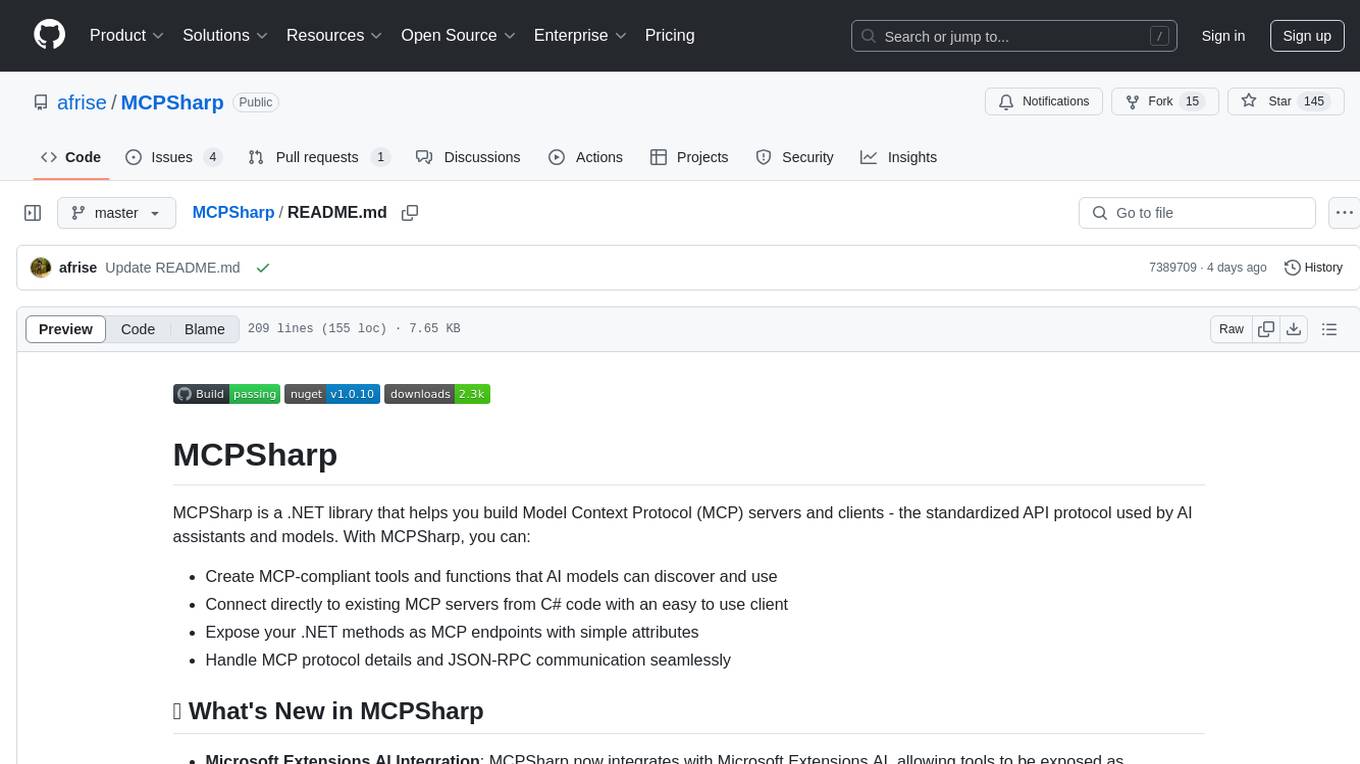
MCPSharp
MCPSharp is a .NET library that helps build Model Context Protocol (MCP) servers and clients for AI assistants and models. It allows creating MCP-compliant tools, connecting to existing MCP servers, exposing .NET methods as MCP endpoints, and handling MCP protocol details seamlessly. With features like attribute-based API, JSON-RPC support, parameter validation, and type conversion, MCPSharp simplifies the development of AI capabilities in applications through standardized interfaces.
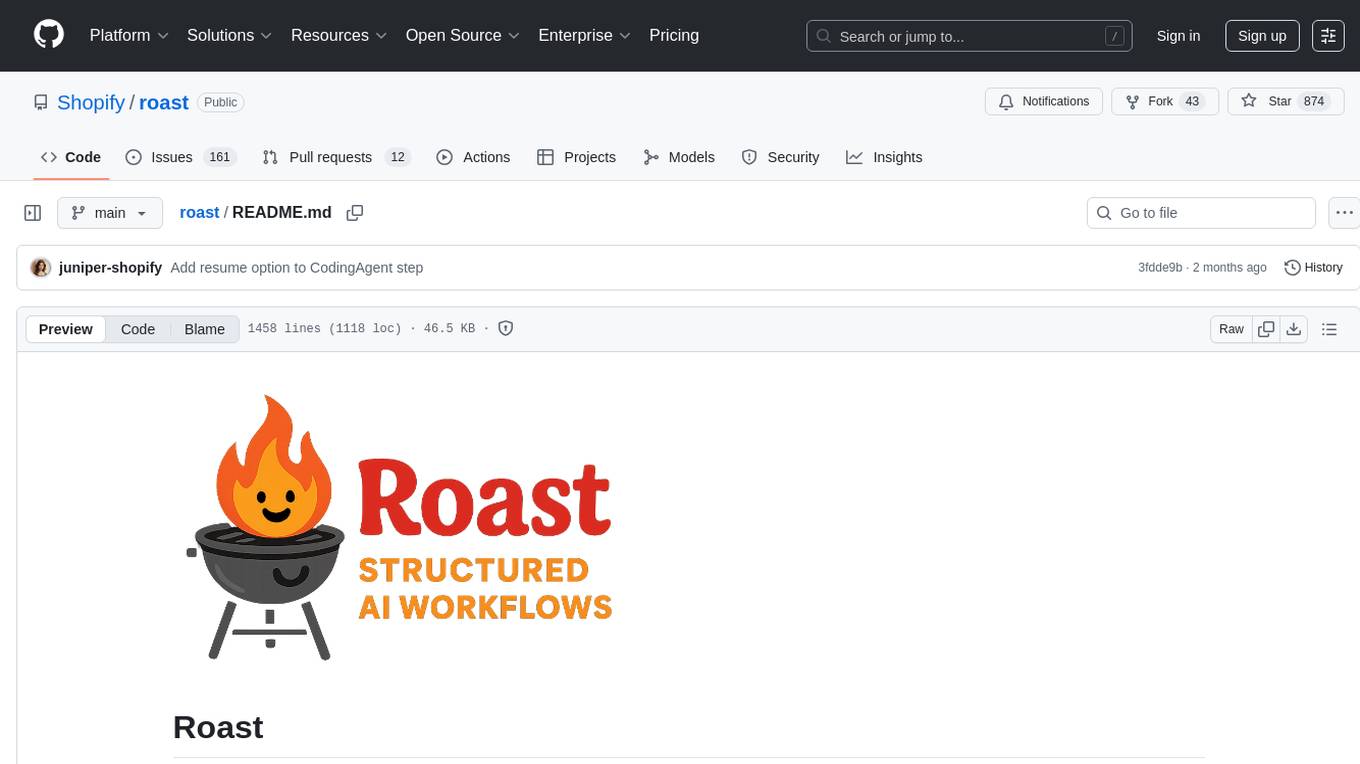
roast
Roast is a convention-oriented framework for creating structured AI workflows maintained by the Augmented Engineering team at Shopify. It provides a structured, declarative approach to building AI workflows with convention over configuration, built-in tools for file operations, search, and AI interactions, Ruby integration for custom steps, shared context between steps, step customization with AI models and parameters, session replay, parallel execution, function caching, and extensive instrumentation for monitoring workflow execution, AI calls, and tool usage.

lollms
LoLLMs Server is a text generation server based on large language models. It provides a Flask-based API for generating text using various pre-trained language models. This server is designed to be easy to install and use, allowing developers to integrate powerful text generation capabilities into their applications.
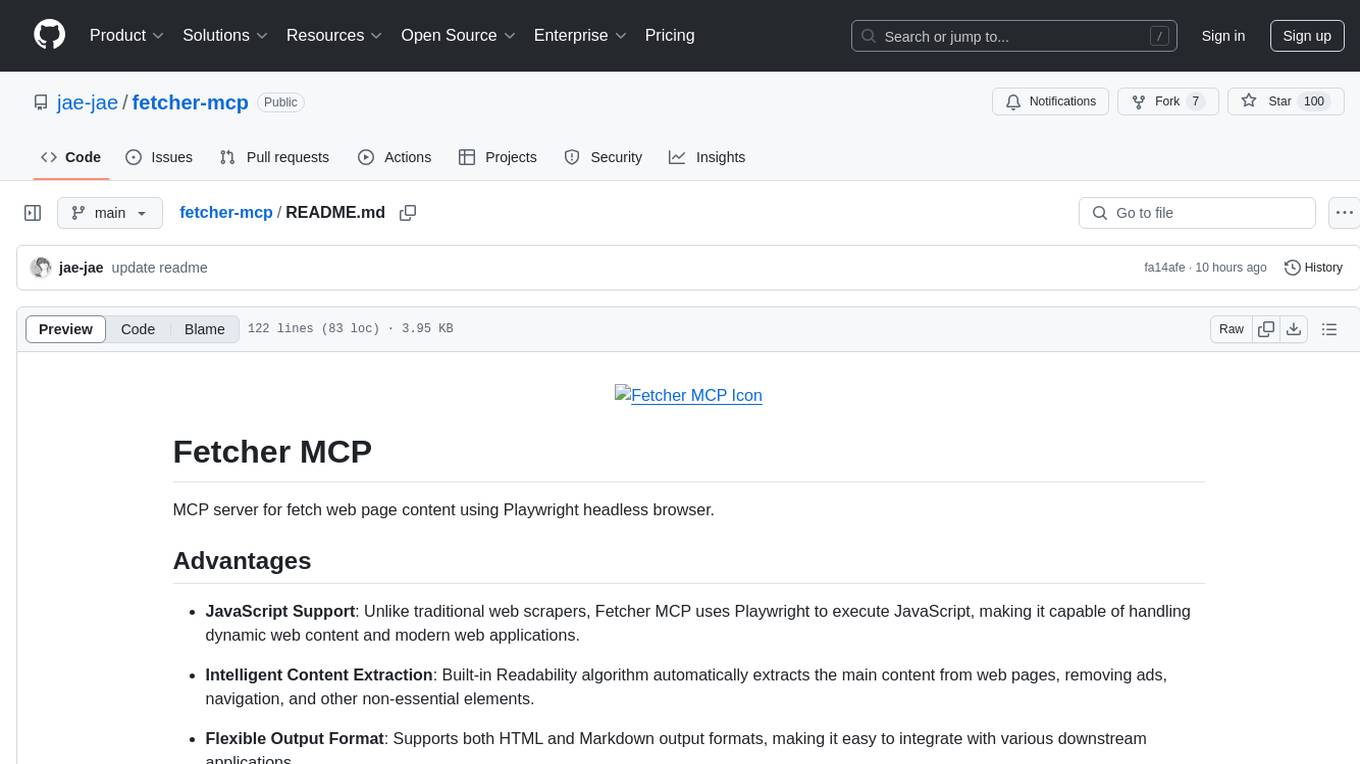
fetcher-mcp
Fetcher MCP is a server tool designed for fetching web page content using Playwright headless browser. It supports JavaScript execution, intelligent content extraction, flexible output formats, parallel processing, resource optimization, robust error handling, and configurable parameters. The tool provides features like fetching web page content from a specified URL, batch retrieving content from multiple URLs, and offers fine-grained control over various parameters. Fetcher MCP is ideal for users looking to scrape dynamic web content efficiently and reliably.
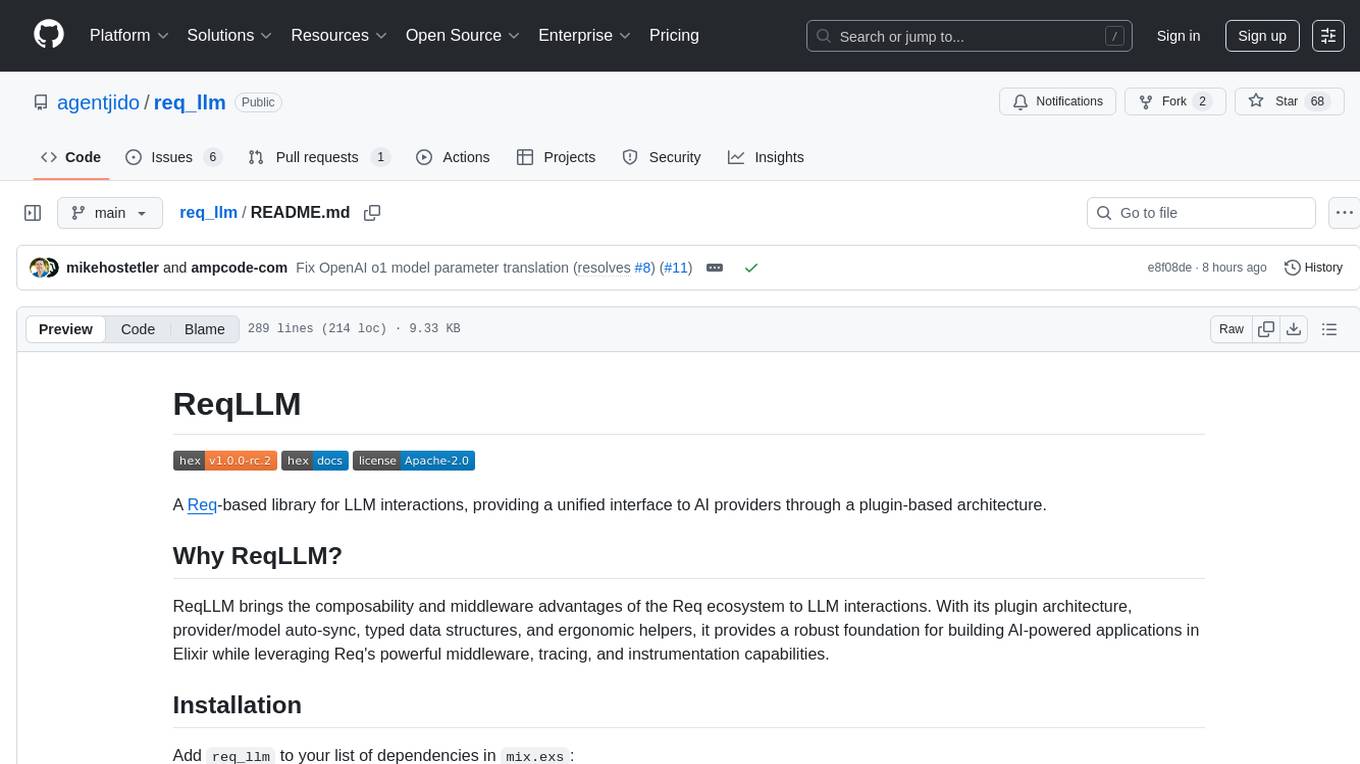
req_llm
ReqLLM is a Req-based library for LLM interactions, offering a unified interface to AI providers through a plugin-based architecture. It brings composability and middleware advantages to LLM interactions, with features like auto-synced providers/models, typed data structures, ergonomic helpers, streaming capabilities, usage & cost extraction, and a plugin-based provider system. Users can easily generate text, structured data, embeddings, and track usage costs. The tool supports various AI providers like Anthropic, OpenAI, Groq, Google, and xAI, and allows for easy addition of new providers. ReqLLM also provides API key management, detailed documentation, and a roadmap for future enhancements.
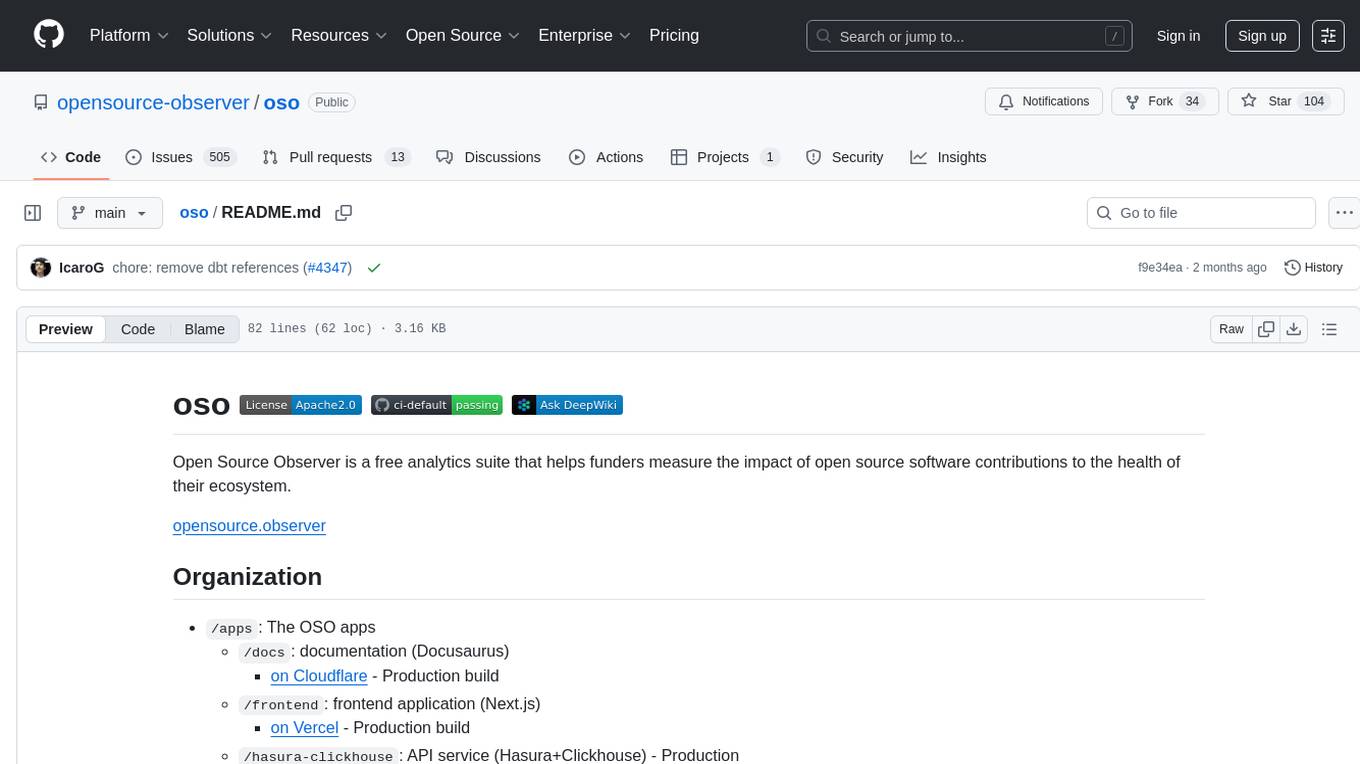
oso
Open Source Observer is a free analytics suite that helps funders measure the impact of open source software contributions to the health of their ecosystem. The repository contains various subprojects such as OSO apps, documentation, frontend application, API services, Docker files, common libraries, utilities, GitHub app for validating pull requests, Helm charts for Kubernetes, Kubernetes configuration, Terraform modules, data warehouse code, Python utilities for managing data, OSO agent, Dagster configuration, sqlmesh configuration, Python package for pyoso, and other tools to manage warehouse pipelines.
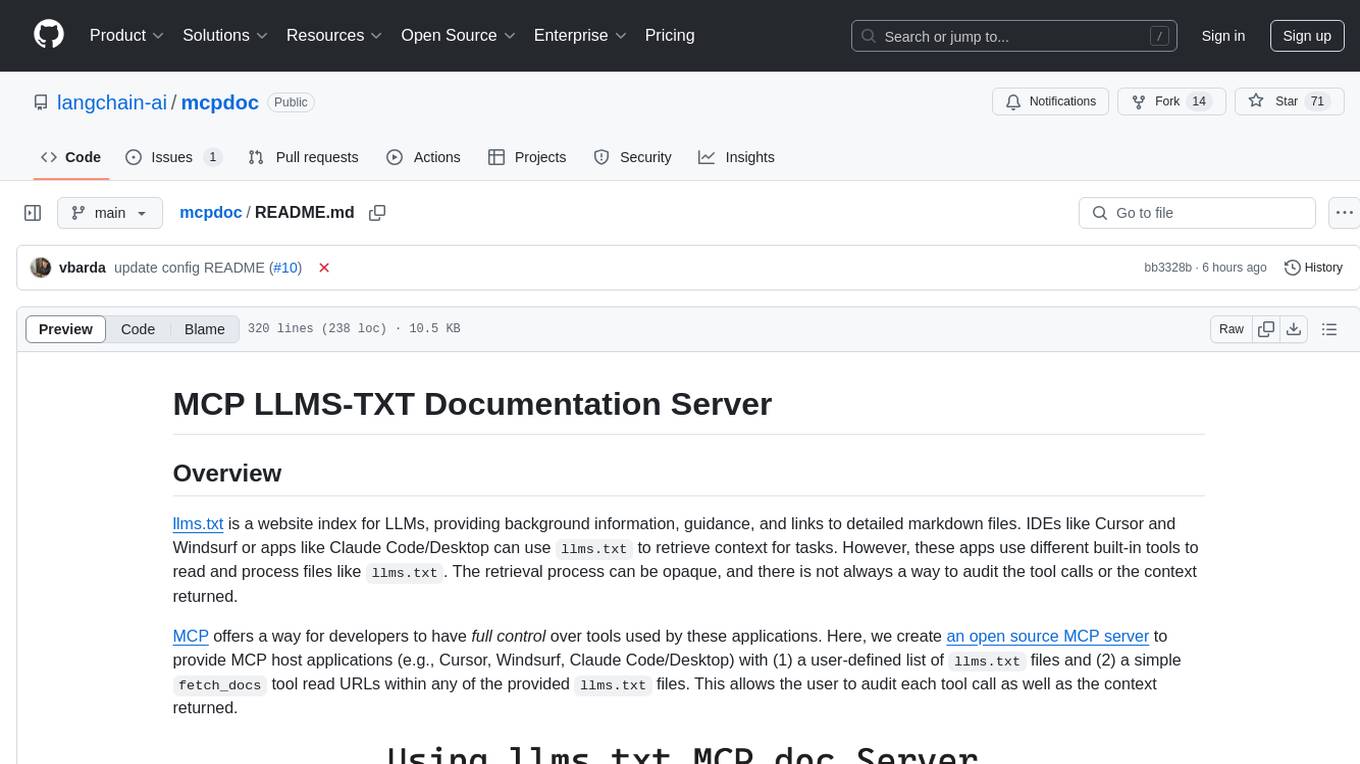
mcpdoc
The MCP LLMS-TXT Documentation Server is an open-source server that provides developers full control over tools used by applications like Cursor, Windsurf, and Claude Code/Desktop. It allows users to create a user-defined list of `llms.txt` files and use a `fetch_docs` tool to read URLs within these files, enabling auditing of tool calls and context returned. The server supports various applications and provides a way to connect to them, configure rules, and test tool calls for tasks related to documentation retrieval and processing.

exif-photo-blog
EXIF Photo Blog is a full-stack photo blog application built with Next.js, Vercel, and Postgres. It features built-in authentication, photo upload with EXIF extraction, photo organization by tag, infinite scroll, light/dark mode, automatic OG image generation, a CMD-K menu with photo search, experimental support for AI-generated descriptions, and support for Fujifilm simulations. The application is easy to deploy to Vercel with just a few clicks and can be customized with a variety of environment variables.
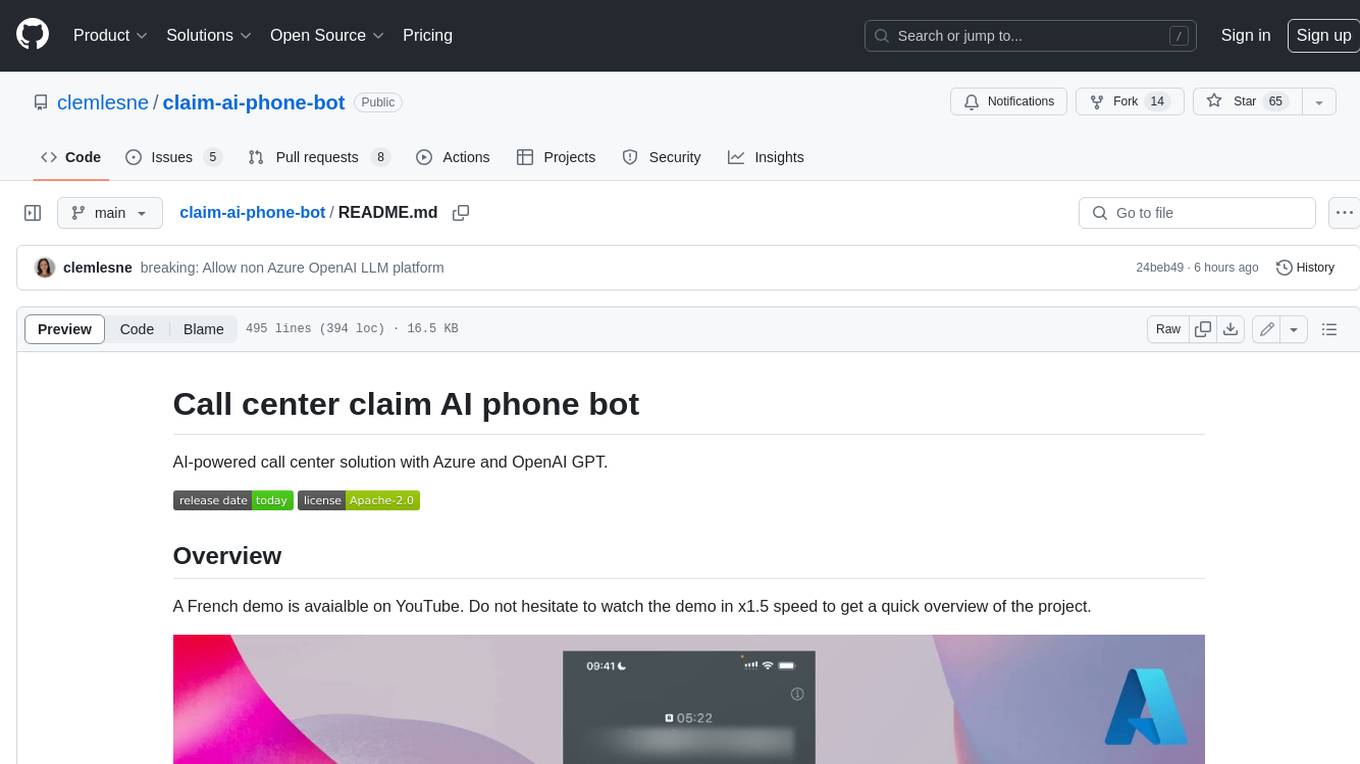
claim-ai-phone-bot
AI-powered call center solution with Azure and OpenAI GPT. The bot can answer calls, understand the customer's request, and provide relevant information or assistance. It can also create a todo list of tasks to complete the claim, and send a report after the call. The bot is customizable, and can be used in multiple languages.
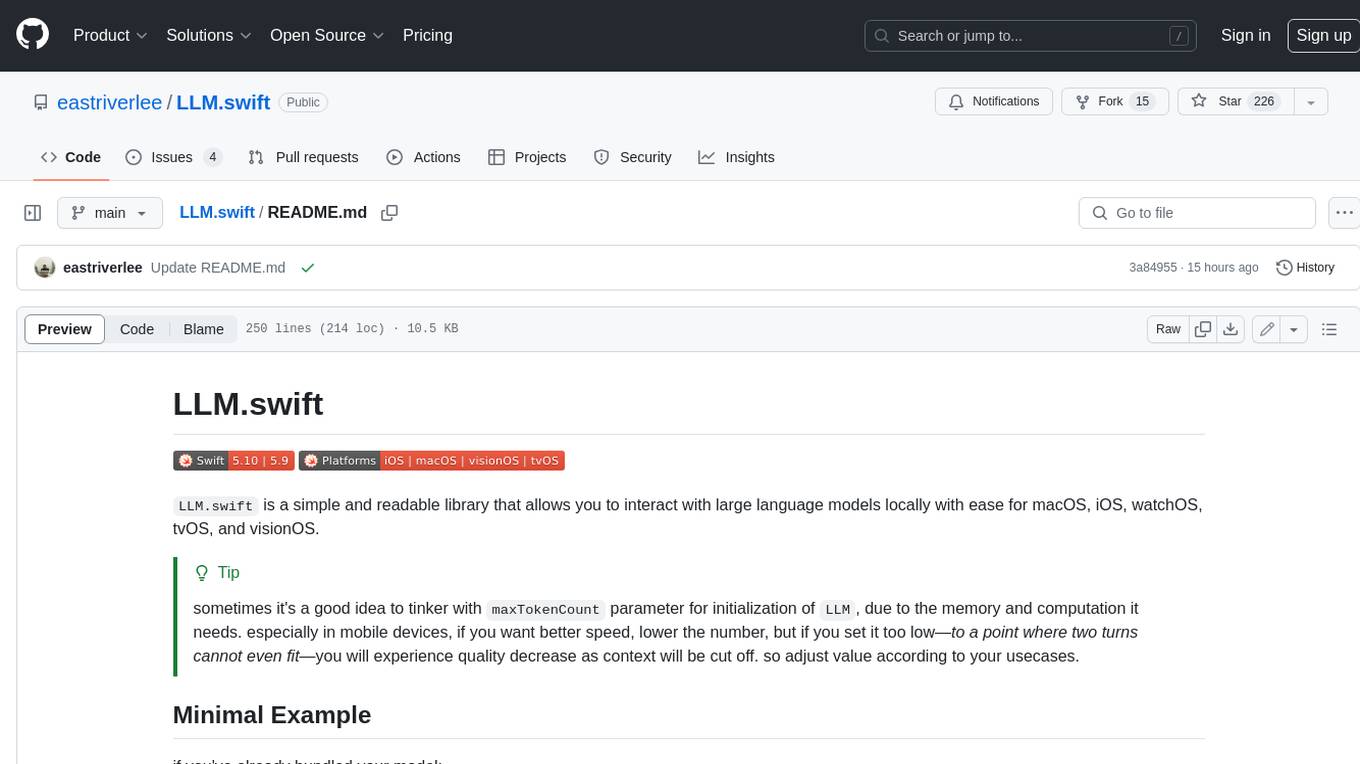
LLM.swift
LLM.swift is a simple and readable library that allows you to interact with large language models locally with ease for macOS, iOS, watchOS, tvOS, and visionOS. It's a lightweight abstraction layer over `llama.cpp` package, so that it stays as performant as possible while is always up to date. Theoretically, any model that works on `llama.cpp` should work with this library as well. It's only a single file library, so you can copy, study and modify the code however you want.
For similar tasks
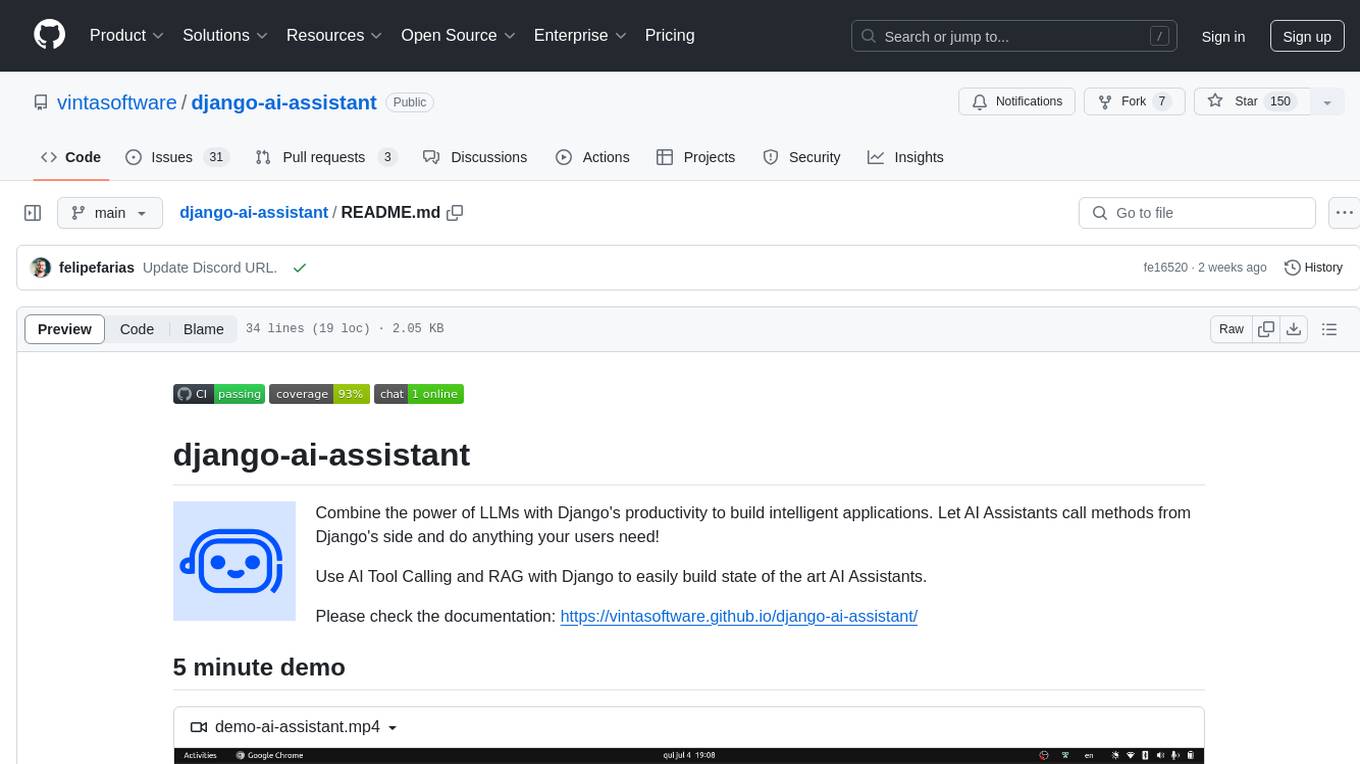
django-ai-assistant
Combine the power of LLMs with Django's productivity to build intelligent applications. Let AI Assistants call methods from Django's side and do anything your users need! Use AI Tool Calling and RAG with Django to easily build state of the art AI Assistants.

aiosql
aiosql is a Python module that allows you to organize SQL statements in .sql files and load them into your Python application as methods to call. It supports various database drivers like SQLite, PostgreSQL, MySQL, MariaDB, and DuckDB. The project is an implementation of Kris Jenkins' yesql library to the Python ecosystem, allowing users to easily reuse SQL code in SQL GUIs or CLI tools. With aiosql, you can write, version control, comment, and run SQL code using files without losing the ability to use them as you would any other SQL file. It provides support for PEP 249 and asyncio based drivers, enabling users to execute parametric SQL queries from Python methods.
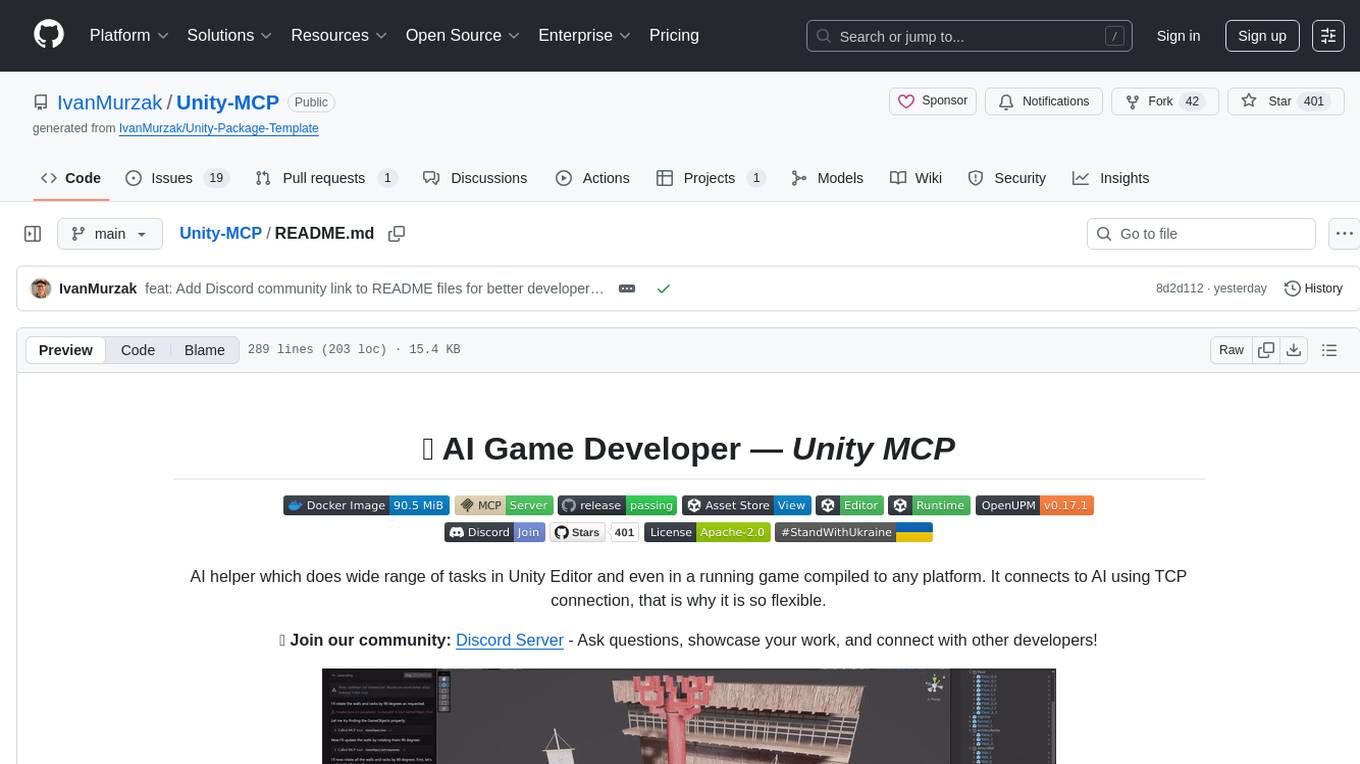
Unity-MCP
Unity-MCP is an AI helper designed for game developers using Unity. It facilitates a wide range of tasks in Unity Editor and running games on any platform by connecting to AI via TCP connection. The tool allows users to chat with AI like with a human, supports local and remote usage, and offers various default AI tools. Users can provide detailed information for classes, fields, properties, and methods using the 'Description' attribute in C# code. Unity-MCP enables instant C# code compilation and execution, provides access to assets and C# scripts, and offers tools for proper issue understanding and project data manipulation. It also allows users to find and call methods in the codebase, work with Unity API, and access human-readable descriptions of code elements.
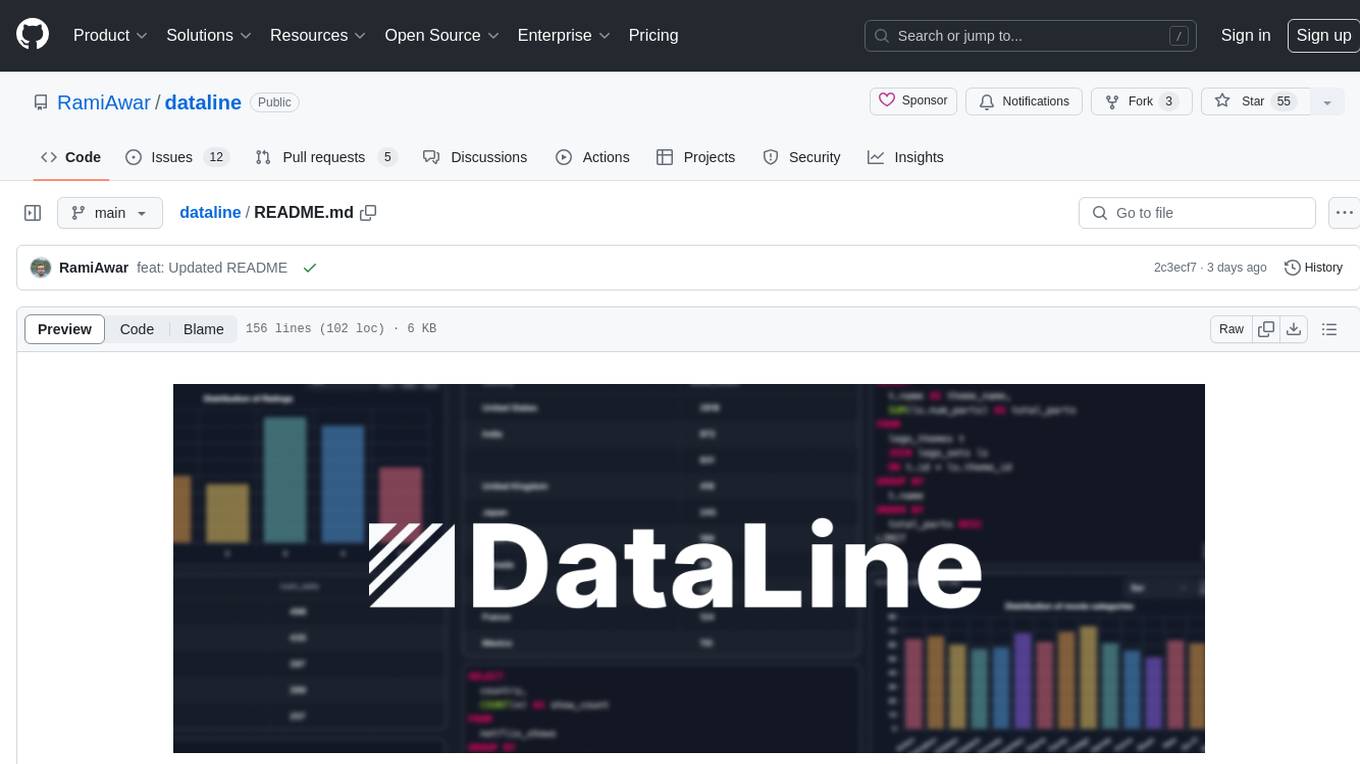
dataline
DataLine is an AI-driven data analysis and visualization tool designed for technical and non-technical users to explore data quickly. It offers privacy-focused data storage on the user's device, supports various data sources, generates charts, executes queries, and facilitates report building. The tool aims to speed up data analysis tasks for businesses and individuals by providing a user-friendly interface and natural language querying capabilities.
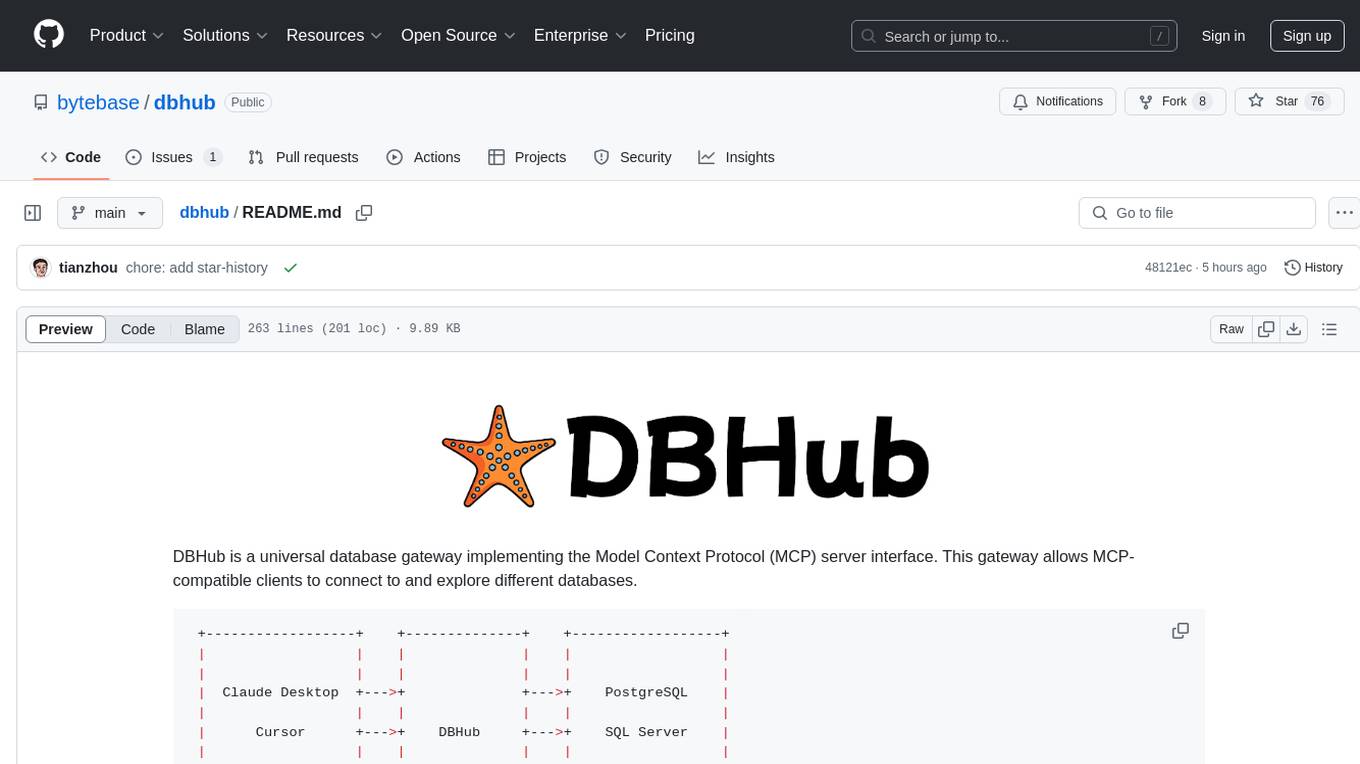
dbhub
DBHub is a universal database gateway that implements the Model Context Protocol (MCP) server interface. It allows MCP-compatible clients to connect to and explore different databases. The gateway supports various database resources and tools, providing capabilities such as executing queries, listing connectors, generating SQL, and explaining database elements. Users can easily configure their database connections and choose between different transport modes like stdio and sse. DBHub also offers a demo mode with a sample employee database for testing purposes.
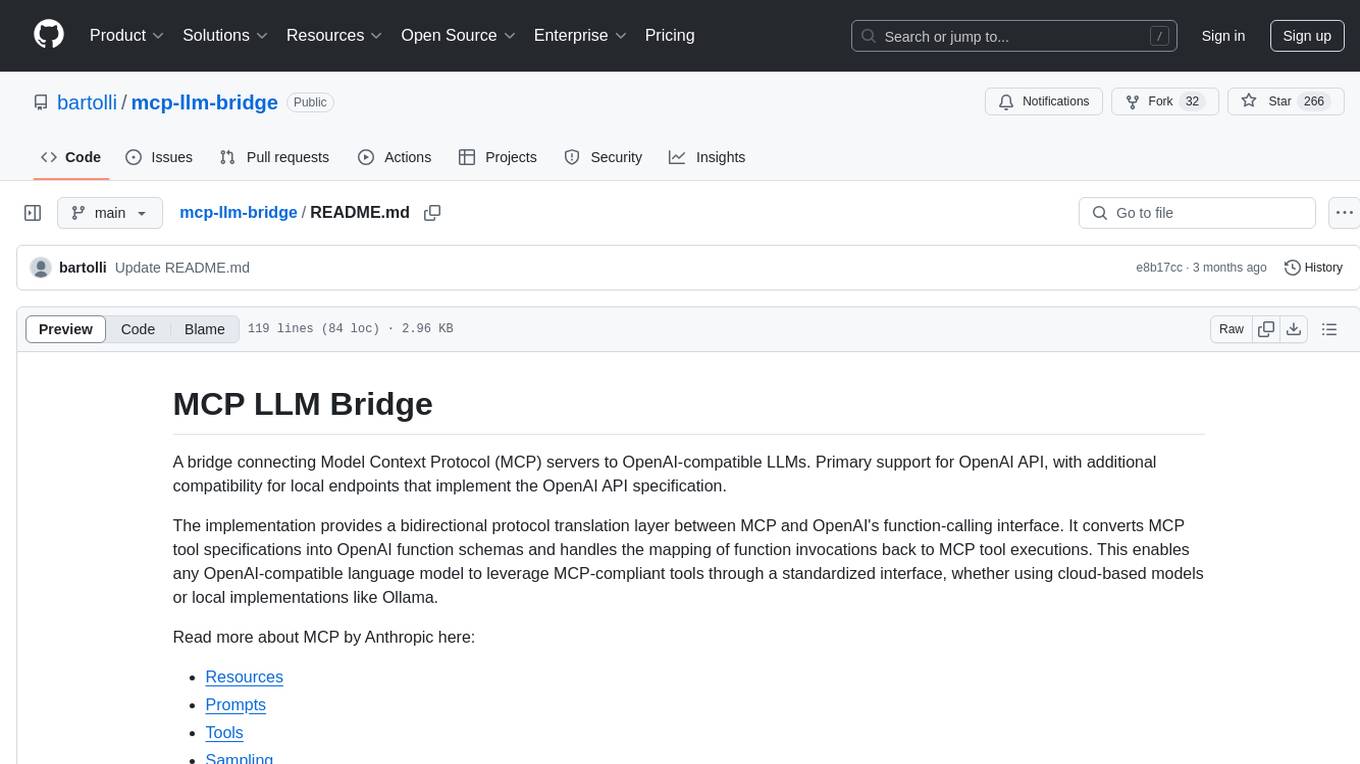
mcp-llm-bridge
The MCP LLM Bridge is a tool that acts as a bridge connecting Model Context Protocol (MCP) servers to OpenAI-compatible LLMs. It provides a bidirectional protocol translation layer between MCP and OpenAI's function-calling interface, enabling any OpenAI-compatible language model to leverage MCP-compliant tools through a standardized interface. The tool supports primary integration with the OpenAI API and offers additional compatibility for local endpoints that implement the OpenAI API specification. Users can configure the tool for different endpoints and models, facilitating the execution of complex queries and tasks using cloud-based or local models like Ollama and LM Studio.
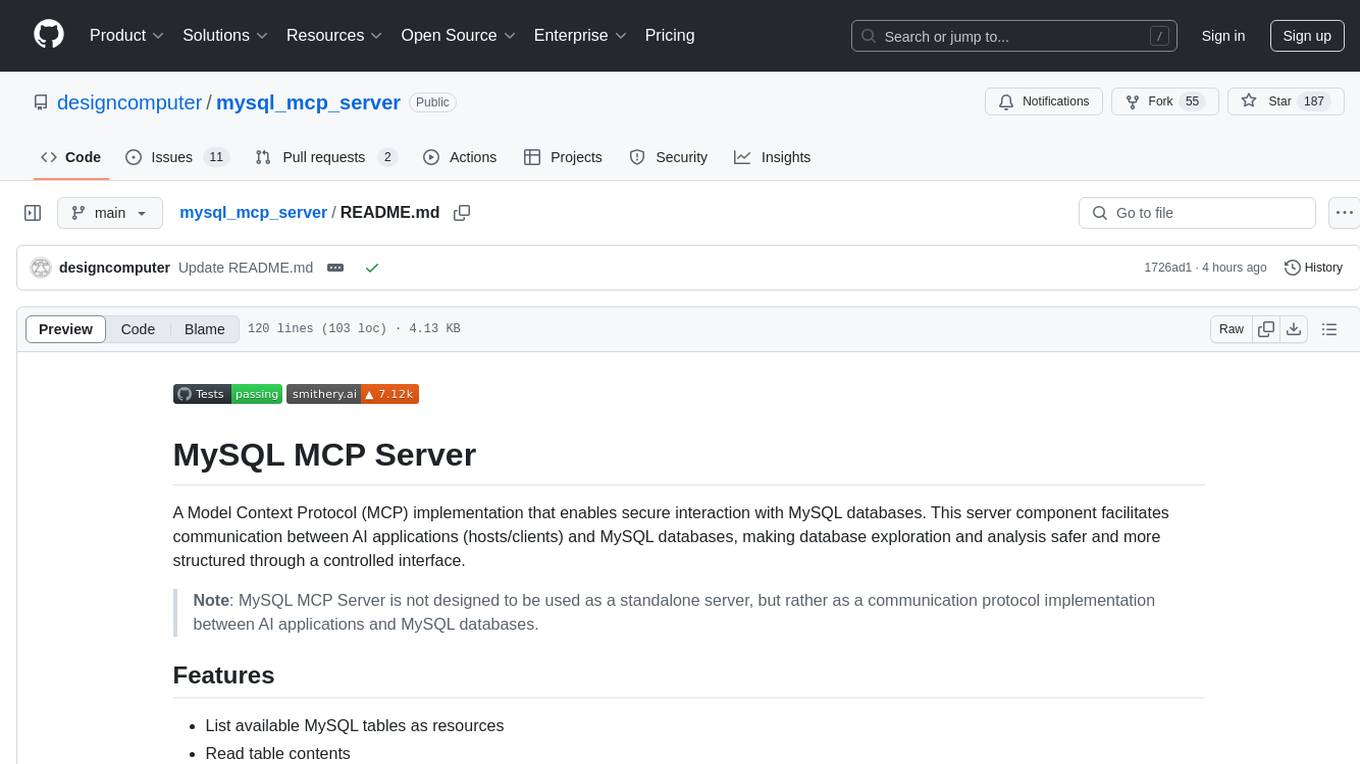
mysql_mcp_server
A Model Context Protocol (MCP) server that enables secure interaction with MySQL databases. This server allows AI assistants to list tables, read data, and execute SQL queries through a controlled interface, making database exploration and analysis safer and more structured. It provides features such as listing available MySQL tables as resources, reading table contents, executing SQL queries with proper error handling, secure database access through environment variables, and comprehensive logging. The tool ensures security best practices by never committing environment variables or credentials, using a database user with minimal required permissions, implementing query whitelisting for production use, and monitoring and logging all database operations.
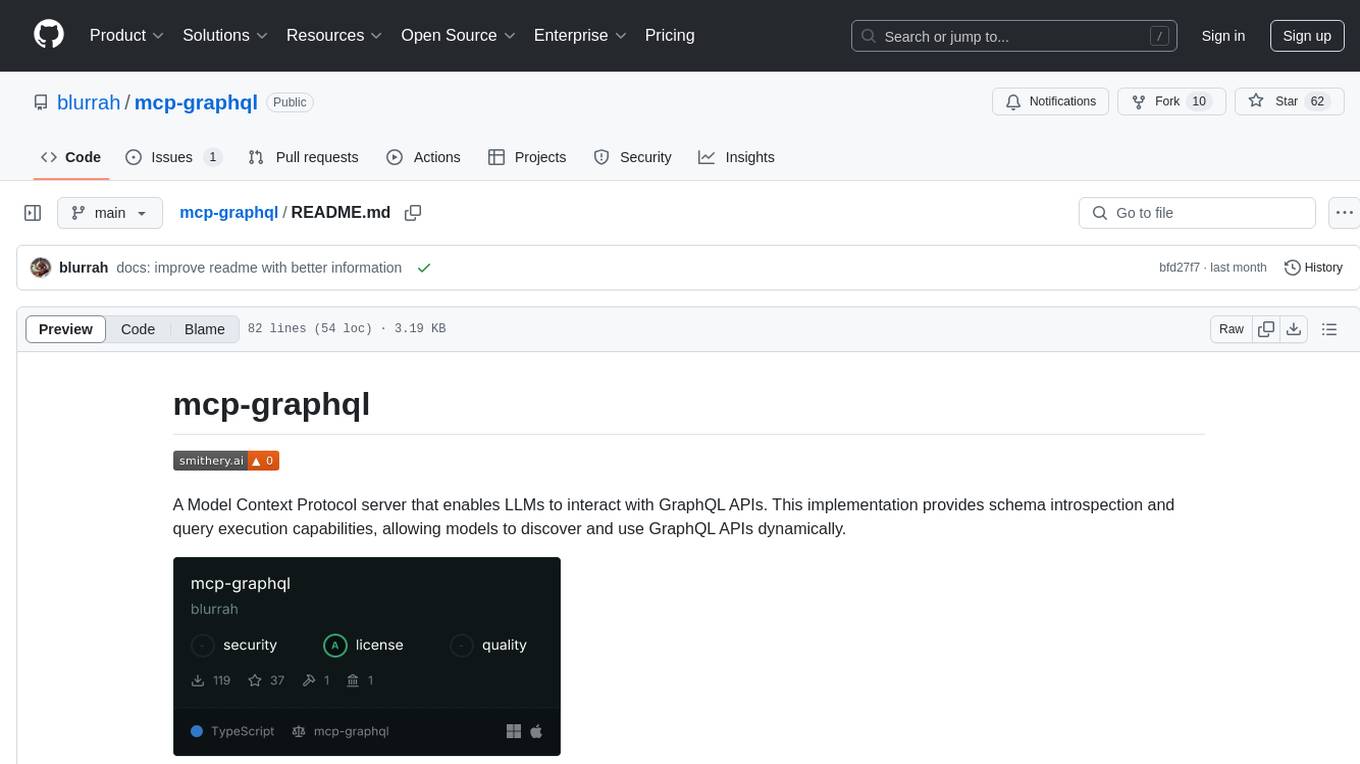
mcp-graphql
mcp-graphql is a Model Context Protocol server that enables Large Language Models (LLMs) to interact with GraphQL APIs. It provides schema introspection and query execution capabilities, allowing models to dynamically discover and use GraphQL APIs. The server offers tools for retrieving the GraphQL schema and executing queries against the endpoint. Mutations are disabled by default for security reasons. Users can install mcp-graphql via Smithery or manually to Claude Desktop. It is recommended to carefully consider enabling mutations in production environments to prevent unauthorized data modifications.
For similar jobs

resonance
Resonance is a framework designed to facilitate interoperability and messaging between services in your infrastructure and beyond. It provides AI capabilities and takes full advantage of asynchronous PHP, built on top of Swoole. With Resonance, you can: * Chat with Open-Source LLMs: Create prompt controllers to directly answer user's prompts. LLM takes care of determining user's intention, so you can focus on taking appropriate action. * Asynchronous Where it Matters: Respond asynchronously to incoming RPC or WebSocket messages (or both combined) with little overhead. You can set up all the asynchronous features using attributes. No elaborate configuration is needed. * Simple Things Remain Simple: Writing HTTP controllers is similar to how it's done in the synchronous code. Controllers have new exciting features that take advantage of the asynchronous environment. * Consistency is Key: You can keep the same approach to writing software no matter the size of your project. There are no growing central configuration files or service dependencies registries. Every relation between code modules is local to those modules. * Promises in PHP: Resonance provides a partial implementation of Promise/A+ spec to handle various asynchronous tasks. * GraphQL Out of the Box: You can build elaborate GraphQL schemas by using just the PHP attributes. Resonance takes care of reusing SQL queries and optimizing the resources' usage. All fields can be resolved asynchronously.

aiogram_bot_template
Aiogram bot template is a boilerplate for creating Telegram bots using Aiogram framework. It provides a solid foundation for building robust and scalable bots with a focus on code organization, database integration, and localization.

pluto
Pluto is a development tool dedicated to helping developers **build cloud and AI applications more conveniently** , resolving issues such as the challenging deployment of AI applications and open-source models. Developers are able to write applications in familiar programming languages like **Python and TypeScript** , **directly defining and utilizing the cloud resources necessary for the application within their code base** , such as AWS SageMaker, DynamoDB, and more. Pluto automatically deduces the infrastructure resource needs of the app through **static program analysis** and proceeds to create these resources on the specified cloud platform, **simplifying the resources creation and application deployment process**.

pinecone-ts-client
The official Node.js client for Pinecone, written in TypeScript. This client library provides a high-level interface for interacting with the Pinecone vector database service. With this client, you can create and manage indexes, upsert and query vector data, and perform other operations related to vector search and retrieval. The client is designed to be easy to use and provides a consistent and idiomatic experience for Node.js developers. It supports all the features and functionality of the Pinecone API, making it a comprehensive solution for building vector-powered applications in Node.js.

aiohttp-pydantic
Aiohttp pydantic is an aiohttp view to easily parse and validate requests. You define using function annotations what your methods for handling HTTP verbs expect, and Aiohttp pydantic parses the HTTP request for you, validates the data, and injects the parameters you want. It provides features like query string, request body, URL path, and HTTP headers validation, as well as Open API Specification generation.

gcloud-aio
This repository contains shared codebase for two projects: gcloud-aio and gcloud-rest. gcloud-aio is built for Python 3's asyncio, while gcloud-rest is a threadsafe requests-based implementation. It provides clients for Google Cloud services like Auth, BigQuery, Datastore, KMS, PubSub, Storage, and Task Queue. Users can install the library using pip and refer to the documentation for usage details. Developers can contribute to the project by following the contribution guide.

aioconsole
aioconsole is a Python package that provides asynchronous console and interfaces for asyncio. It offers asynchronous equivalents to input, print, exec, and code.interact, an interactive loop running the asynchronous Python console, customization and running of command line interfaces using argparse, stream support to serve interfaces instead of using standard streams, and the apython script to access asyncio code at runtime without modifying the sources. The package requires Python version 3.8 or higher and can be installed from PyPI or GitHub. It allows users to run Python files or modules with a modified asyncio policy, replacing the default event loop with an interactive loop. aioconsole is useful for scenarios where users need to interact with asyncio code in a console environment.

aiosqlite
aiosqlite is a Python library that provides a friendly, async interface to SQLite databases. It replicates the standard sqlite3 module but with async versions of all the standard connection and cursor methods, along with context managers for automatically closing connections and cursors. It allows interaction with SQLite databases on the main AsyncIO event loop without blocking execution of other coroutines while waiting for queries or data fetches. The library also replicates most of the advanced features of sqlite3, such as row factories and total changes tracking.